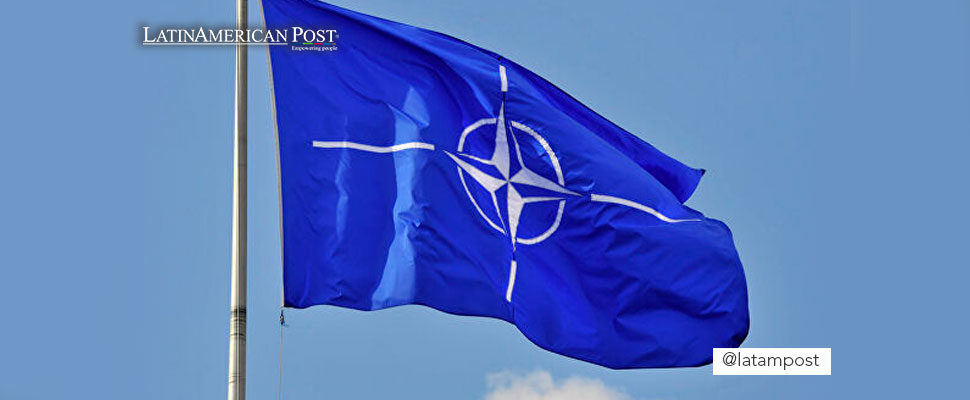What Implication Does the New Treaty Between Colombia and NATO Have?
Colombia recently signed a new treaty with the North Atlantic Organization. Many Russian allies in the region view the new agreement between Colombia and NATO with suspicion

Photo: AFP
LatinAmerican Post | Santiago Gómez Hernández
In recent weeks, NATO has made world news. This is due to the tensions between the West and Russia over the crisis in Ukraine and a possible entry of this former Soviet republic into the military group that “threatens” Moscow. However, lately, the North Atlantic Treaty Organization (NATO) has also made headlines in Latin America due to an agreement signed with Colombia.
The Government of Iván Duque recently signed an association treaty between the Andean country and the military cooperation group. According to Colombian Defense Minister Diego Molano, this agreement focuses on areas of security, climate change, and the fight against transnational crimes.
However, this is not the only approach, nor the first that the South American nation has had with the group. Colombia had already been a “global partner” of NATO, since 2017. But being a global partner does not mean being a complete member of the group. Mainly, because the NATO scheme is based on a geographical location, which is defined in North America and Europe and has the explicit intention of serving as a counterweight to the other military superpower: Russia.
Colombia lleva casi 10 años como aliado de la @NATO, estos han sido los hitos clave en esta relación. pic.twitter.com/2Uqs2h0O3g
— ICP ?? (@ICPColombia) February 22, 2022
Also read: What Interests Does Russia Have in Latin America?
However, Colombia is the only global partner of NATO in Latin America, which represents a clear intention of the country to eventually join To the group. The main question is the reasons. Colombia, despite the discrepancies that occur in the region and with Venezuela, has no threat of invasion from any superpower. Similarly, NATO is based on a principle of defense and not attack, this, added to the little belligerent history of the Latin nations, does not show a clear intention to use it offensively.
What would the presence of Colombia mean for NATO?
Despite the fact that Colombia has one of the most prepared armies in the fight against guerrillas and drug trafficking, it is a country with little experience in foreign and peace missions. Additionally, the South American country is not a large producer of war material or technology, so beyond personnel on the ground and advice on specific issues, Colombia will contribute little outside its borders.
In recent years, Colombia has invested more than 3% of its GDP in defense, much higher (proportionally) than any other NATO member, not counting the United States. Of rest, the Latin American country is one of those that invest the largest budget in defense, mainly due to a civil war. This would indicate that, despite having a large arsenal and army, most of it is destined to solve its own conflict. Then it would not be of much help in international operations.
En Congreso de EE. UU., piden designar a Colombia aliado ‘extra’ de la Otán
Esta designación, con implicaciones en temas de seguridad , solo la poseen 17 países del mundo. Le contamos ? https://t.co/NaQthfcCqG pic.twitter.com/ngil2EhKwx
— Canal Citytv (@Citytv) February 17, 2022
On the other hand, Colombia insists on being a great support in training issues for the Armed Forces of the 30 member states of NATO. “We have a center of excellence, the humanitarian demining training center due to the entire process that Colombia has had, which has become a leading country that exchanges information and training: more than one hundred NATO soldiers have been trained in that center,” Molano said after signing the agreement.
Geographically, Colombia provides important support in the area. In case of need, NATO has a great ally in the South American country. Let us not forget that in the group’s operations against Muammar Gaddafi’s regime, Italy served as the center of airstrikes carried out by NATO.
A treaty that will possibly endure over time
Despite the fact that the signing government is that of President Iván Duque, on the Colombian right, Colombia’s presence in NATO will endure over time. Recently in a televised debate, Gustavo Petro, who leads the polls and is the main leader of the left, was not in favor of Colombia leaving the group. He preferred to refrain from giving a positive or negative answer, which could be read as a wink to keep the country within the group.
Latin Front in the NATO-Russia Struggle
Another question that arises is if Colombia were to fully join NATO, this would increase tensions between the United States and Russia. Honestly, it’s unlikely. Despite the fact that Iván Duque has pointed out Russia’s intervention in Colombian internal politics and has denounced the presence of Russian soldiers on the border, a scenario similar to that experienced in Ukraine is unlikely.
Although Colombia still maintains territorial disputes with Venezuela and Nicaragua (Moscow’s allies), a direct conflict between the two would be unlikely in the current context. The border delimitations between countries in the area have not had belligerent overtones in decades and other mechanisms such as the OAS allow tensions to be resolved diplomatically.
However, it could involve Colombia in international conflicts in which NATO must be immersed. If the North Atlantic group gets involved in a direct war with Russia in Ukraine, this would involve all its members, which could drag Colombia (if it is a member and not a partner) into it. From there, it will also depend on what role Russian allies play in the area, such as Venezuela, and whether it is in their interests to enter as an ally of Russia and put both Latin countries on opposite shores.





